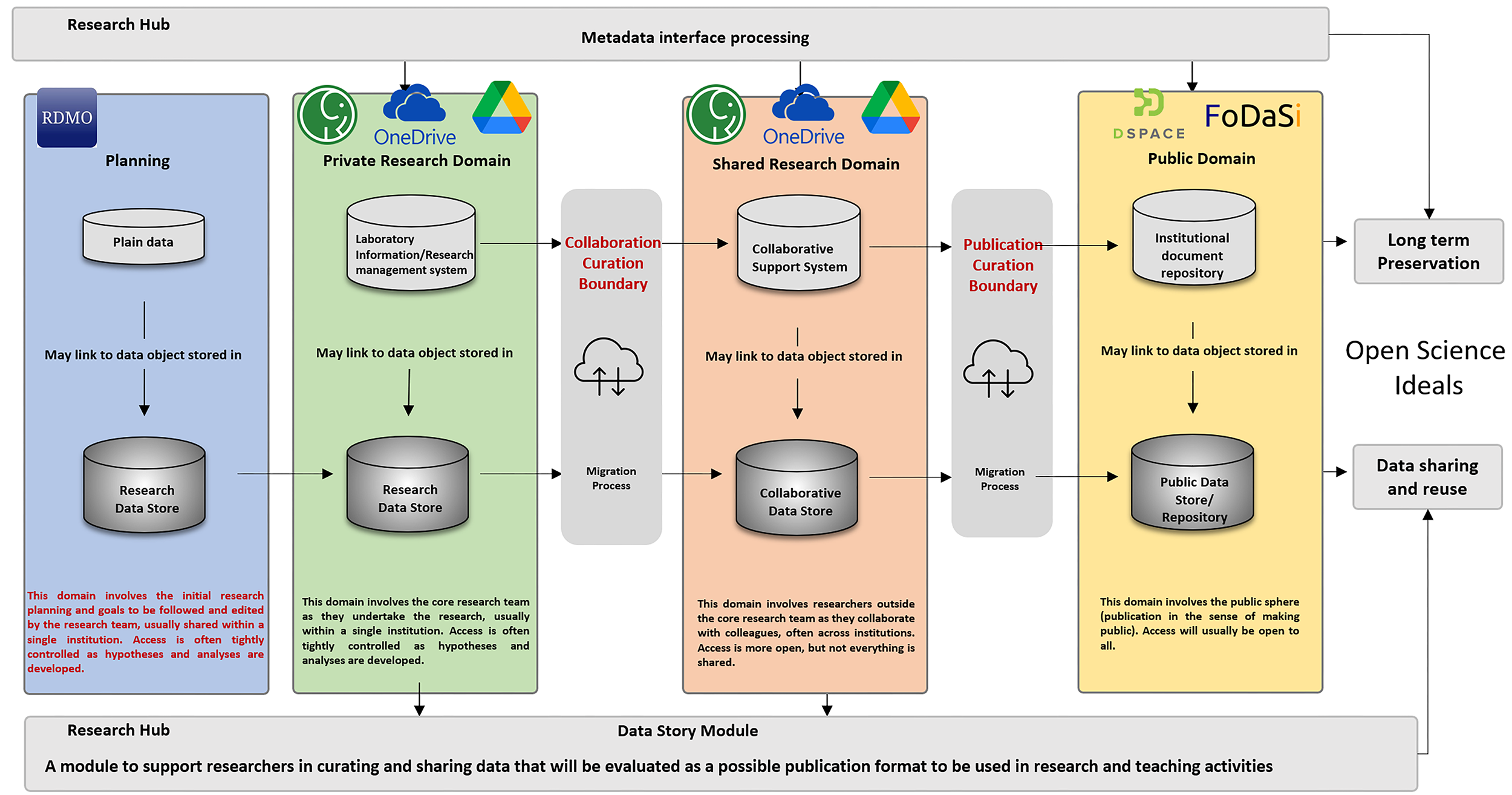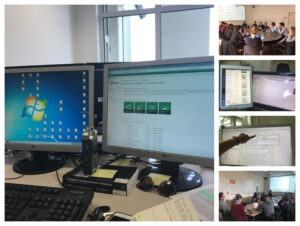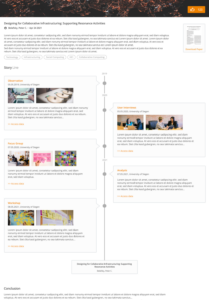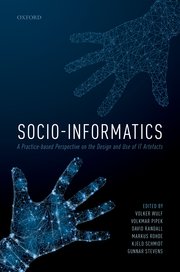INF - Infrastructures for Collaborative Sensory RDM Practices
N.N.
N.N.
Prof. Dr. Kai Daniel
(Former Principal Investigator)
Friederike Breuer, M.A.
(Associate Member)
Dr. Helena Karasti
(Associate Member)
Annette Strauch, M.A.
(Associate Member)
Dr. Matthias Korn
(Associate Member)
Dr. Michael Dahnke
(Associate Member)
„The project is concerned with the design, implementation and evaluation of workflows and tools for collaborative research data management, with a focus on sensing and sense-making.“
Executive Summary
The results of the sub-project INF from the second funding phase focused on infrastructural research data management (RDM) solutions for praxeological research practice, which are the focus of SFB 1187. This includes providing discipline-independent basic infrastructures, processes and services for long-term archiving and teaching data protection skills. Based on this, in cooperation with the researchers, (a) a solution tailored to praxeological research methods for documenting research data practices ("research hub"), (b) research data infrastructure by using interfaces to various verification and work environments (e.g. ORCID, RDMO, Sciebo, DSpace) and (c) comprehensive interface for processing the metadata and Data Story concept were developed.
In the upcoming third phase, the INF project will continue to focus on providing necessary basic infrastructures on the one hand and developing specialized research data infrastructures on the other hand, taking into account sensor data and sensory practices. Focus is on the following areas:
- Further developing and testing the implemented collaborative RDM workflows, modules and concepts with a focus on sensory and meaningful data practices.
- (Further) developing technological tools for acquiring (sensing) and evaluating (sense-making) sensor data in the research process, including digital and sensory methods
- Capturing the critical reflexivity of current research data practices and examining the collaborative appropriation of the IT tools provided for this.
- Assisting in exploring machine learning methods for sensory data practices.
Basic data infrastructures are further developed and maintained by the applicants in close coordination with the IT infrastructures that already exist at the ZIMT. During development, special attention is paid to the legal and ethical guidelines, fundamentals of information security, data protection and FAIR data principles, because these areas play a particularly important role with regard to sensory data practices. In addition, together with the sub-projects, it should be explored what role the use of machine learning methods can play in collecting and especially analyzing the research data collected. At the same time, the metadata interface is continuously updated and expanded in order to offer the created metadata description as comprehensive a set of all data formats used as possible. Furthermore, interfaces are developed and evaluated that integrate external software systems via secure interfaces. This is achieved through a participatory, practice-based approach together with the communities of practice established in the CRC 1187. The INF project documents and reflects the research-based appropriation practices as well as cooperatively constituting research infrastructures and their methods.
INF focuses on the further development of research data infrastructures with a focus on sensory media:
- Development and evaluation of collaborative Research Data Management (RDM) workflows
- Implementation of new modules for cross-platform data work
- Discussion and critical reflection of AI-based methods and tools
- Provision and integration of data stories for curating and sharing (media) ethnographic data

(Treloar et al. 2008, 6)

INF project functions as translator and mediator for institutional requirements, legal/technical standards, and researcher needs as well as practices.
It uses participatory and user-centered design methods.
Interdisciplinary discussions on sensor data collaboration and machine learning effects on RDM practices
- Empirical practice analysis alongside design and conceptualization of research data infrastructures
- Attention on sensor systems and requirements analysis
WP1 aims to test and further develop collaborative sensory RDM workflows, providing technological and organizational support and removing barriers that may prevent meeting the FAIRness criteria.
WP2 involves extending and adapting modules to include other file-sharing systems and metadata interface processing.
WP3 focuses on supporting the reflexivity of AI-based data practices through demonstration and tech lab.
The aim is to ensure that the process does not depend on custom scripts that are not supported in the long term
compared to APIs.

➔ Find the Project Archive 2020–2023 here
Publications
Current
Socio-Informatics: A Practice-based Perspective on the Design and Use of IT Artifacts
The last 25 years have seen a small revolution in our approach to the understanding of new technology and information systems. It has become a founding assumption of computer-supported cooperative work and human–computer interaction that in the future, if not already, most computer applications will be socially embedded in the sense that they will become infrastructures (in some sense) for the development of the social practices which they are designed to support. Assuming that IT artifacts have to be understood in this sociotechnical way, traditional criteria for good design in computer science, such as performance, reliability, stability or usability, arguably need to be supplemented by methods and perspectives which illuminate the way in which technology and social practice are mutually elaborating. This book concerns the philosophy, conceptual apparatus, and methodological concerns which will inform the development of a systematic and long-term human-centered approach to the IT-product life cycle, addressing issues concerned with appropriation and infrastructuring. This entails an orientation to “practice-based computing.” The book contains a number of chapters which examine both the conceptual foundations of such an approach, and a number of empirical case studies that exemplify it.
Wulf, Volker, Volkmar Pipek, David Randall, Markus Rhode, Kjeld Schmidt und Gunnar Stevens, Hrsg. 2018. Socio-Informatics: A Practice-based Perspective on the Design and Use of IT Artifacts. First edition. Oxford, United Kingdom: Oxford University Press. DOI: 10.1093/oso/9780198733249.001.0001.



